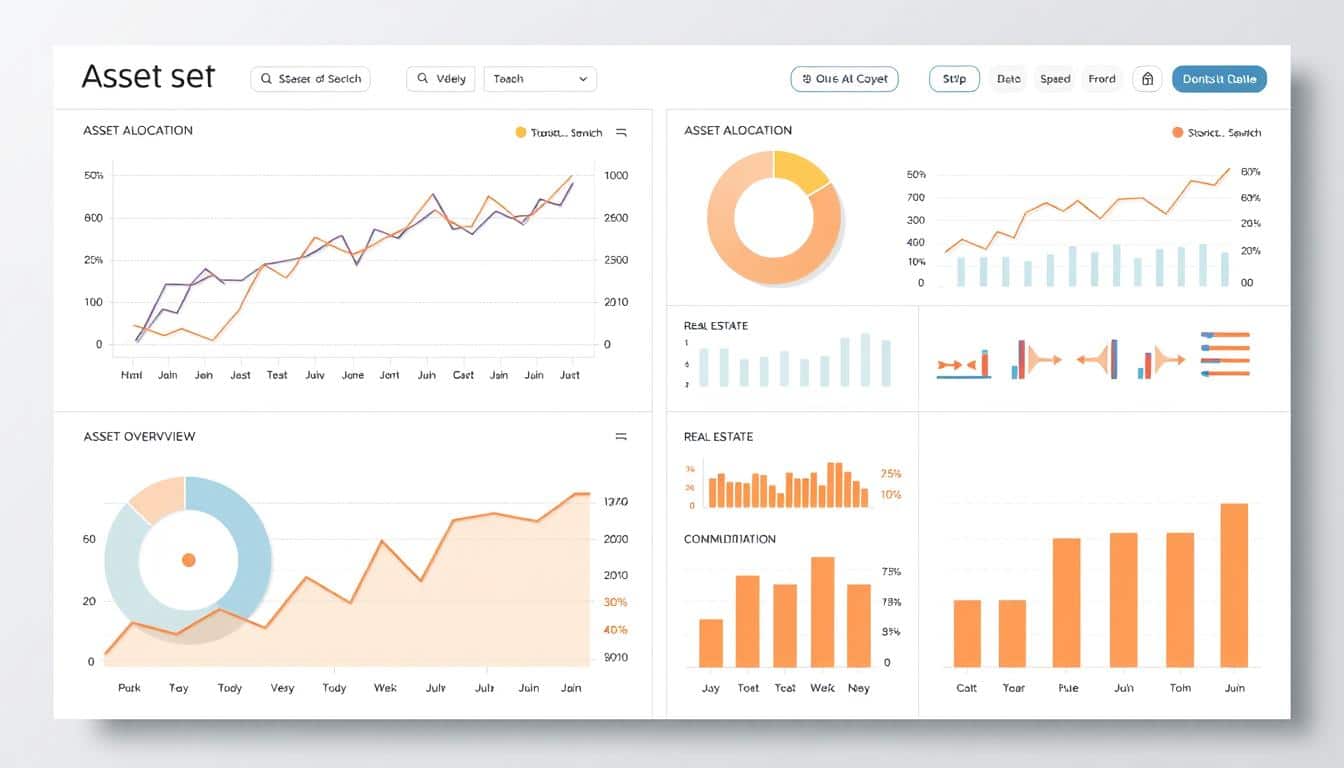In today’s world, securing your financial future takes more than guesswork. It requires expert advice that fits your situation. Managing money can seem scary, but with the right help, you can make a strong plan. Firms like YMSK Financial offer tailored advice. They help with setting up budgets and investing smartly so you can make wise choices. Getting professional advice sets you and your family up for success in the future.
The Importance of Financial Planning
Financial planning is key for gaining financial security. It deals with managing your money, saving, and investing wisely. Many people don’t know enough about it, which makes learning its principles vital for success.
Anúncios
Understanding Financial Security
Financial security means having enough to cover your bills now and in the future. It’s not just about having cash. It also includes planning for a stable money situation. People can improve their financial well-being. They do so by budgeting well and saving regularly.
The Role of a Structured Financial Plan
A well-thought-out financial plan is like a map to your money goals. It keeps track of your savings and investments. Having this plan helps keep your finances steady, letting you make smart choices. It lets you change your money direction when needed.

Identifying Your Financial Goals
Setting clear financial goals is key to achieving stability. Goals are of three types: short-term, mid-term, and long-term. Each type plays an important role in securing your financial future.
Short-Term Financial Goals
Short-term goals last up to one year. They focus on immediate needs, such as:
- Setting a monthly budget to manage expenses
- Paying off high-interest debts
- Building a small emergency fund
Meeting short-term goals helps motivate you. It prepares you to face bigger financial challenges.
Mid-Term Financial Goals
Goals for the mid-term are set for one to five years. They need careful planning and may include:
- Saving for higher education expenses
- Accumulating a down payment for a home
- Planning for significant travel or experiences
Working on mid-term goals connects short-term successes to your long-term plans.
Long-Term Financial Goals
Long-term goals aim at securing your future, typically over five years. These goals include:
- Retirement saving through 401(k) plans or IRAs
- Investing in real estate or diversified portfolios
- Estate planning to ensure wealth transfer according to one’s wishes
Realizing the importance of long-term goals leads to lasting wealth and security.
Key Components of Financial Advice
Understanding key parts of financial advice is crucial for your money’s stability and growth. This includes budgeting, saving, and growing investments. Each plays a big role in keeping your finances secure. They help you make a plan that’s good for your future money health.
Budgeting for Success
Budgeting is crucial for any good money plan. It lets you see your income and spending, helping you keep track. You split your money into needs, wants, and savings. This way, you stay in control and can spot where to cut back. A strong budget means you spend wisely and save well.
The Importance of Saving
Saving means you’ll have money for later or emergencies. Putting money aside regularly changes how you see your finances. It makes you feel safer. Good ways to save include having a savings account, automatic transfers, and clear goals. These steps build a safety net for surprises or big moments in life.
Investment Strategies for Growth
Investing helps your money grow over time. A balanced portfolio has stocks, bonds, and other options that fit your risk level. It’s important to understand market trends and your own goals. Getting smart advice on investing can boost your chances of making more money in the long run.
Setting Achievable Financial Goals
Setting achievable financial goals is key for a secure future. With SMART criteria—Specific, Measurable, Achievable, Relevant, Time-bound—you set goals that fit you. This method makes your goals clear and helps you track your progress well.
Creating SMART Goals
Creating SMART goals is vital for financial success. These goals need to be:
- Specific: Define your goal clearly.
- Measurable: Set ways to measure progress.
- Achievable: Make sure goals are realistic.
- Relevant: Your goals should fit your financial plan.
- Time-bound: Have a deadline for urgency.
Prioritizing Your Financial Objectives
Prioritizing your financial goals is crucial. Start with the most important ones for stability. This lets you use your resources wisely.
By focusing on top priorities first, you lay a strong foundation. This way, you can reach bigger dreams by fitting smaller goals into your plan.
Strategies for Effective Budgeting
Managing your money well is key to reaching your financial dreams. The 50/30/20 rule is a simple way to organize your income. It helps you divide your earnings into needs, wants, and savings. Using budgeting tools and apps also helps you keep track of your money and stay on course.
Implementing the 50/30/20 Rule
Half of your income, or 50%, is used for essential needs like home costs, bills, and food. Another 30% is for things you enjoy, such as movies or dinners out. The last 20% goes towards saving money and paying off debts. This plan helps you manage your money well, giving you control and room to grow financially.
Choosing Budgeting Tools
For better budget management, you can use different budgeting tools and apps. Tools like Mint and You Need A Budget (YNAB) are easy to use. They help you watch your spending and aim for your financial targets. These apps keep you informed, making sure your budget fits with your financial goals.
Building an Emergency Fund
Building an emergency fund is key for staying financially stable. This fund is like a safety net for unexpected costs like health crises or losing a job. It keeps people from getting into debt during hard times. Knowing how much to save and the best place to keep your money is key for successful saving.
How Much to Save
Saving up three to six months’ worth of crucial expenses is what experts recommend for a solid emergency fund. For freelancers or people with changing incomes, saving for up to 12 months’ expenses is smart. Setting a clear savings goal helps you be prepared for any financial problems.
Where to Keep Your Emergency Fund
Your emergency fund should be in a savings account you can easily get to. Look for accounts that let you take out money without penalties. High-yield savings accounts offered by many banks are great. They help your emergency fund grow while staying accessible. Choosing the right account means safety and ready money for unplanned bills.
Debt Management Techniques
Managing your debt well is key to staying financially healthy. Knowing the right ways to handle your debt can really improve your finances. Two smart ways to manage debt include the avalanche and snowball methods. It’s also important to know the difference between good debt and bad debt. This knowledge helps people make smart financial decisions.
The Avalanche vs. Snowball Method
The avalanche method involves paying off debts with the highest interest rates first. This strategy reduces the total interest you’ll pay. It’s a good option for people with several loans. The snowball method, however, focuses on clearing the smallest debts first. This helps build confidence, encouraging individuals to take on bigger debts later.
Knowing what makes debt good or bad is crucial for managing it well. Good debt includes things like a low-interest mortgage or student loans that invest in your future. Bad debt, however, includes things like high-interest credit card debt that grows fast and can mess up your finances. By understanding this difference, people can plan their debt repayment better. This ensures a stronger financial future.
Investing for Your Future
Investing for future goals means knowing different investment ways and how to assess risks. There are many options to pick from, fitting your financial plans. Picking the right ones can lead to big gains and help your money grow over time.
Understanding Different Investment Vehicles
There are various types of investments, each with its pros and cons. Some key types include:
- Stocks: Equity investments with the chance for high returns but also more risk.
- Bonds: Fixed-income securities that offer steady returns and are usually less risky than stocks.
- Real Estate: Physical properties that can earn rental income and increase in value.
- Mutual Funds: Investments pooled together for diversification across many assets.
Exploring these options can help your money grow while keeping risk in check.
Risk Assessment in Investments
Assessing risk is key to crafting an investment strategy that fits your financial goals and risk comfort. Important steps in risk assessment include:
- Figuring out what level of risk you’re okay with, based on your financial situation and goals.
- Looking at market and economic conditions that might impact your investments.
- Spreading your investments to lower the chance of loss.
Good risk assessment means you can take advantage of opportunities without risking too much.
Seeking Professional Financial Advice
Talking to a financial advisor can be very helpful, especially at big life moments or with complex money issues. When it comes to planning for retirement, handling investments, or making big purchases, getting advice is key. This advice can make deciding easier and help come up with a solid plan.
When to Consult a Financial Advisor
Knowing when to get professional help can really make a difference in reaching your financial goals. You might want to talk to an advisor if:
- You’re getting close to retirement and need specific advice
- You want to invest but don’t know what’s best
- Big life changes are happening, like getting married or getting an inheritance
- You’re facing tough money choices that need expert input
Benefits of Professional Guidance
Getting help from a pro has a lot of perks for planning your finances. Some top benefits include:
- Plans made just for you, based on your own situation
- Ongoing support and advice as things change
- A deep understanding of the market and where to invest
Looking for financial advice helps you make smarter choices and feel more secure about your money. With advice from experts, you can handle complex financial matters much better.
Regularly Reviewing Your Financial Plan
Managing your money well means checking your financial plan often. Keeping an eye on your progress helps you stick to your money goals. Big life events like getting married, having a baby, or changing jobs can change what’s important money-wise. This means you might have to change your goals.
Monitoring Your Progress
Watching your money grow means looking at your savings, investments, and financial health. Setting times to check in keeps you on track and shows where you might be falling short. Tools like financial apps and spreadsheets make it easier to see how you’re doing.
Adjusting Goals Based on Life Changes
When life changes, you need to be ready to change your financial plans too. Changing your financial goals after big events is key to keeping your finances healthy. For example, having a baby or moving for a new job might mean you have to think differently about how you spend and save your money.
- Review your financial situation annually.
- Set aside time to update your financial goals as necessary.
- Engage with a financial advisor for expert advice during significant life changes.
Conclusion
The journey of financial planning is key for a secure future. Expert advice highlights the need for a plan that fits your goals. By setting clear goals and checking your progress, you can adjust your plan as life changes.
Making smart choices and sometimes talking to a financial pro can make a big difference. Improving your understanding of finances helps you handle the ups and downs of the economy. This way, you’re not just getting by—you’re thriving.
Taking on financial planning as a regular task lets you control your financial future. With guidance from experts and an ongoing effort to learn, you’re on your way to a secure and wealthy future.
FAQ
Why is expert financial advice important for achieving financial security?
What are some key components of a structured financial plan?
How can I set achievable financial goals?
What budgeting strategies can help me manage my finances effectively?
How much should I save in an emergency fund?
What are effective debt management techniques?
What types of investment vehicles are available?
When should I consult a financial advisor?
How often should I review my financial plan?
Conteúdo criado com auxílio de Inteligência Artificial



